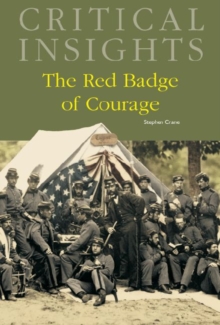The Red Badge of Courage was a sensation when it was first published in 1894.
More vivid, unflinching, and artistically and philosophically complex than any prior war novel, it made its author, Stephen Crane, an overnight international celebrity.
Readers were gripped by Crane's lucid descriptions of warfare and of the vacillating mind of his young, untested soldier, Henry Fleming, and many assumed that he must have been a veteran of the Civil War.
Some actual veterans went so far as to claim that they had fought alongside Crane in the war.
Astonishing as the novel itself is the fact that Crane was only twenty-three when he wrote it and had never even lived through a war, let alone fought in one.
Even today, more than one hundred years after its publication and after generations of readers and decades of commentary, this most famous of Crane's works continues to astonish, amaze, and puzzle. As Eric Carl Link, Professor of American Literature at the University of Memphis, writes in his introduction to this volume in the Critical Insights series, Red Badge is much more than a war novel—it is a drama of the human psyche, a pinnacle of American naturalism and impressionism, a precursor to modernism, and a brilliant comment on the relations between human beings and our universe.
As the essays collected here can attest, the novel is rich in interpretive possibilities. For readers studying Red Badge for the first time, a quartet of introductory essays provide valuable background.
Matthew J. Bolton examines how the culture of the 1890's—with its clashes over immigration, industrialization, poverty, and military policy—influenced Crane and, in another essay, how Jean-Paul Sartre's existentialism can improve our understanding of the novel.
Patrick K. Dooley offers a comprehensive survey of the veritable ocean of Red Badge criticism, and Stanley B.
Greenfield draws on two of Crane's short stories to resolve some of the some of the critical issues that have long plagued scholars of Red Badge. Continuing the discussion are a variety of classic and contemporary essays on the novel.
Author and poet James M. Cox provides a comprehensive overview of the novel and praises it as "one of the great war novels of world literature." Harold R.
Hungerford turns to Civil War history to establish the battle Crane on which modeled the action of his story.
Robert C. Albrecht analyzes Crane's use of narrative point of view to show how it supports Crane's concept of reality.
Thomas L. Kent takes up Crane's stance of epistemological uncertainty, and Eric Carl Link likewise examines his subjectivism.
Ben Satterfield argues that, despite some critics' qualms, the novel is a unified, coherent work of art that projects a humanistic vision, and Donald Pizer, in the course of an examination of the textual controversies surrounding the novel, agrees with Satterfield that it is a unified and coherent work.
Jacqueline Tavernier-Courbin examines the use of humor and fallacious reasoning in the novel.
James W. Tuttleton and James Trammell Cox analyze Crane's imagery, and William B.
Dillingham pieces together Crane's concept of courage and heroism.
Robert M. Rechnitz and Harold Kaplan then weigh in on two perennial questions—whether Henry Fleming matures over the course of the novel and the meaning of the novel's ending—and Verner D.
Mitchell offers a highly innovative reading of race and gender in the work. Also included in this volume are a brief biography of Crane's life, a celebration of Crane's achievement by Paris Review contributor Barry Harbaugh, a chronology of Crane's life, and a detailed bibliography for readers wishing to study this classic American novel in greater depth.

